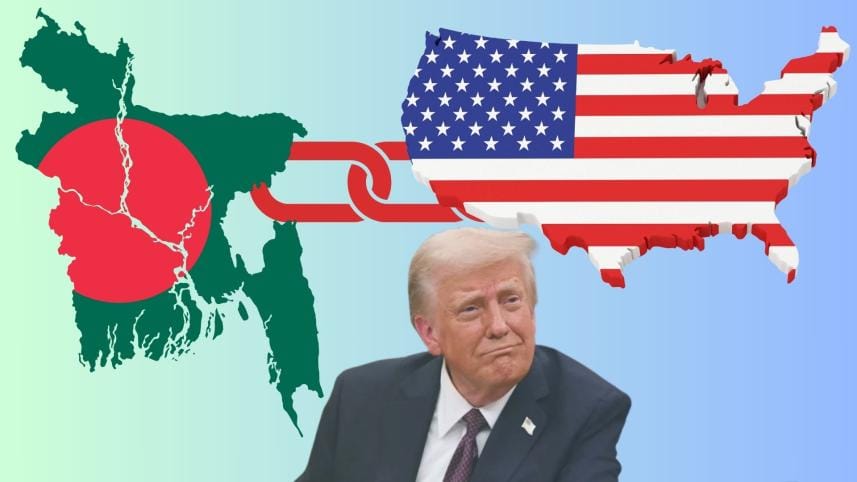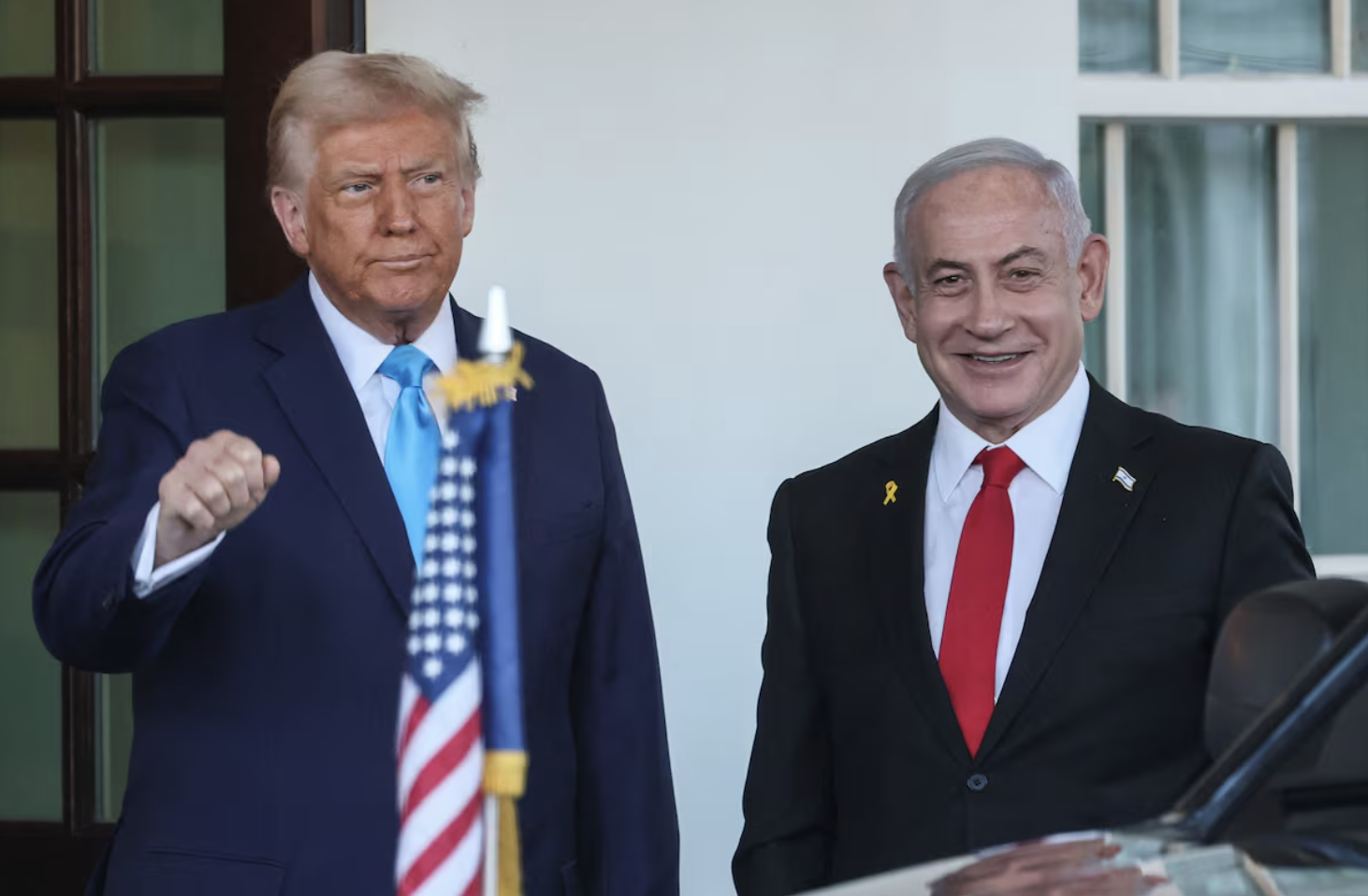In the Trump 2.0 era, what’s in store for Bangladesh-US relations?

Donald Trump's re-election to the Oval Office marks the beginning of a new chapter in global politics. Unlike his first term, where perceptions of him as a showman dominated discussions, this tenure is grounded in clarity. His identity as a capitalist, ultra-nationalist, and self-proclaimed disruptor of traditional norms has already been established. This time, however, the stakes are higher as his policies have a proven track record of shaking institutions like the Senate and international alliances. Trump's sweeping victory raises critical questions for Bangladesh, a country that lies thousands of kilometres away, yet is intricately connected to US policies.
The US is one of Bangladesh's most significant partners, both economically and politically. As Bangladesh's largest export destination, the US accounted for $10.41 billion of its total exports in 2022, primarily from the ready-made garment (RMG) sector. Any shifts in the US trade policy, particularly under Trump's "America First" doctrine, could have severe repercussions for this lifeline of Bangladesh's economy.
Moreover, the US is a critical development partner. US agencies have channelled billions into sectors such as healthcare, education, and disaster preparedness in Bangladesh. For instance, during the Covid pandemic, the country provided over 100 million vaccine doses and $140 million in assistance, underscoring its role as a reliable ally in crises. The cancellation of USAID's activities globally for the next three months has sparked serious concern for Dhaka on its journey of development.
Bangladesh's strategic significance in the Indo-Pacific region adds another layer of complexity. The Indo-Pacific Strategy (IPS) has made Bangladesh a key player in maintaining balance in the region rife with geopolitical tensions. During Sheikh Hasina's tenure, Bangladesh declared its own Indo-Pacific Outlook, aligning with the broader goals of the IPS. The US views our country as a potential counterbalance to China's growing influence in South Asia, especially through the Belt and Road Initiative (BRI).
The Burma Act, passed under the Biden administration, also underscores the US's vested interest in addressing Myanmar's instability, where China holds significant sway. With Bangladesh hosting over one million Rohingya refugees, the US has so far provided $2.4 billion in humanitarian aid since the crisis began in 2017. Under Trump, a contraction in such aid could exacerbate an already dire situation.
Meanwhile, Trump's trade policies, characterised by tariffs and protectionism, pose a direct threat to Bangladesh's export-oriented economy. His previous tenure saw a focus on reshoring manufacturing jobs to the US, often at the expense of developing countries. While Bangladesh is not directly targeted by US tariffs, competition from Vietnam and China—countries with Free Trade Agreements (FTAs) with the US—remain a concern. The lack of a Bangladesh-US FTA puts our country's RMG sector at a disadvantage, potentially leading to market losses.
The Trump administration's withdrawal from the Paris Agreement during his first term sent shockwaves through global climate initiatives. Bangladesh, ranked among the countries most vulnerable to climate change, relies heavily on international climate financing. Contraction in climate funding during Trump's second term could derail Bangladesh's efforts to combat rising sea levels, frequent cyclones, and erratic monsoons.
Trump's stringent immigration policies, including restrictions on H-1B visas, also create uncertainties for the Bangladeshi diaspora in the US, which numbers over 800,000. This community plays a crucial role in fostering Bangladesh-US relations through remittances, investments, and advocacy. Stricter immigration rules could hinder their contributions, while Trump's rhetoric on minorities may alienate this group further.
Bangladesh's foreign policy must navigate the delicate balance between China and the US. On the one hand, China is Bangladesh's largest trading partner and a key investor in infrastructure projects under the BRI. On the other, the US remains crucial for exports, development aid, and global advocacy. The deep sea exploration potential in Bangladesh's maritime zone adds another dimension to this balancing act.
India's role further complicates this equation. The India-US partnership has strengthened under the IPS framework and India's influence in South Asia could pressure Bangladesh to align with US interests. However, Bangladesh's strained relations with India over issues like border management and trade deficits require careful manoeuvring to avoid becoming a pawn in larger geopolitical rivalries.
Before the election, Trump's tweets about "minority persecution" in Bangladesh raised eyebrows. His close ties with Indian Prime Minister Narendra Modi also fuelled speculations about India's role in his campaign. While some supporters of the Awami League believe Trump's re-election could help Sheikh Hasina restore her position, historical evidence suggests that US foreign policy often transcends partisan politics. For instance, the Biden administration materialised sanctions on the Rapid Action Battalion (RAB), a process initiated during Trump's first term.
While US foreign policy has traditionally been shaped by a consistent prioritisation of its own interests, Trump's characteristic unpredictability introduces an added layer of complexity for nations like Bangladesh. This necessitates a proactive and multifaceted approach to mitigate potential challenges and seize emerging opportunities. Strengthening diplomatic channels should be the foremost priority for Bangladesh. The mission in Washington must actively engage with the Trump administration to decode its shifting priorities and align Bangladesh's policies accordingly. Transparent and consistent dialogue can preempt misunderstandings and foster a mutually beneficial relationship.
Simultaneously, diversifying export markets is essential to reduce economic vulnerability. While the US remains a top destination for Bangladeshi garments, exploring new markets in Europe, the Middle East, and Africa can ensure economic resilience against potential trade barriers or changes in the US trade policy. For instance, leveraging preferential trade agreements with the European Union and tapping into emerging markets like Saudi Arabia and Nigeria can bolster export stability.
The Bangladeshi-American diaspora represents an untapped reservoir of influence. Mobilising this community to advocate for policies favourable to Bangladesh can create a ripple effect in shaping US policy. Their active engagement in US political and civic platforms can amplify Bangladesh's concerns and opportunities in Washington's policy corridors.
Regionally, enhancing cooperation with neighbouring countries, including India, Nepal, and Myanmar, is crucial to maintaining a balanced geopolitical stance. Collaborative efforts in trade, security, and infrastructure development can strengthen Bangladesh's positioning amid US-China competition in South Asia. For example, trilateral dialogues focusing on economic connectivity and maritime security may act as a confidence-building measure.
Lastly, internal stability is non-negotiable. Political harmony, governance reforms, and economic inclusivity are vital to presenting a unified and resilient Bangladesh on the global stage. Ensuring effective governance and addressing domestic challenges will not only strengthen Bangladesh's negotiating position, but also project a reliable image to international partners. With these concerted efforts, Bangladesh can navigate the uncertainties of Trump's second term while safeguarding its national interests. By prioritising diplomacy, diversifying economic partnerships, and strengthening internal governance, Bangladesh can not only mitigate risks but also seize opportunities in a rapidly changing global landscape. In doing so, the country can ensure that its aspirations for a democratic, stable, and prosperous future remain intact.
Mahfuz Mishu is foreign affairs editor at Jamuna Television. He can be reached at mishubdf@gmail.com.
Views expressed in this article are the author's own.
Follow The Daily Star Opinion on Facebook for the latest opinions, commentaries and analyses by experts and professionals. To contribute your article or letter to The Daily Star Opinion, see our guidelines for submission.




 For all latest news, follow The Daily Star's Google News channel.
For all latest news, follow The Daily Star's Google News channel. 



Comments